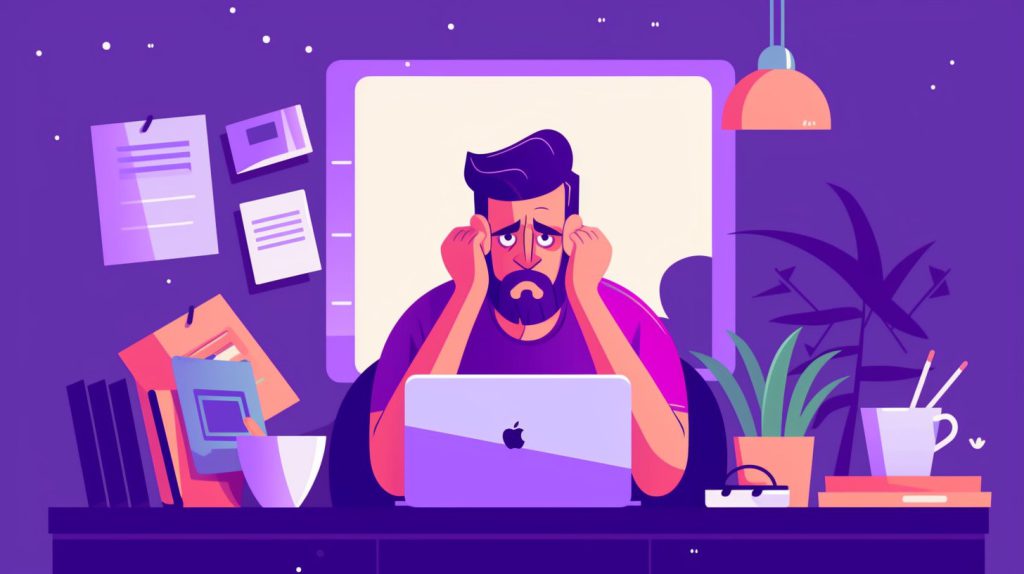INTP and Anxiety: What is the Connection?

Picture this: a quiet, introspective individual engrossed in a complex problem, unraveling the intricacies of a challenging puzzle. They are an INTP, one of the sixteen personality types classified by the Myers-Briggs Type Indicator. This unique personality profile often comes with a hidden companion – anxiety. The world of INTPs is a fascinating blend of intellectual prowess and introspective tendencies, but it’s also a realm where anxiety can thrive. Let’s delve into the complex relationship between INTP and anxiety, shedding light on the challenges and strategies for navigating this intricate mental landscape.
INTP Personality
INTPs are a unique breed. They’re introverted thinkers, often seen as the quiet, analytical brains behind the scenes. INTPs tend to dive deep into complex problems, seeking logical solutions. They’re the engineers, scientists, and philosophers among us, always ready to dissect ideas with their surgical precision.
Scientific research has linked the INTP personality to specific traits. For example, a study published in the “Journal of Psychological Type” suggests that INTPs typically score high on measures of logical thinking and introversion. These traits are at the core of an INTP’s nature, shaping how they perceive and interact with the world.
INTPs, like every personality type, have their strengths and weaknesses. Let’s take a quick tour of both:
Strengths
- Analytical Minds: INTPs excel at breaking down complex problems, making them superb problem-solvers.
- Creativity: Their out-of-the-box thinking often leads to innovative solutions.
- Open-Mindedness: They’re receptive to new ideas and love to explore different perspectives.
Weaknesses
- Social Challenges: INTPs’ introverted nature can make social interactions a bit tricky, contributing to social anxiety.
- Procrastination: Their deep thinking sometimes leads to analysis paralysis, causing procrastination and, potentially, anxiety.
- Perfectionism: INTPs may set impossibly high standards for themselves, leading to anxiety when they can’t meet them.
These strengths and weaknesses are essential for understanding how INTPs interact with their own anxiety, as we’ll explore further in this article.
| Read more: INTP Social Anxiety | Are INTPs at Risk of Social Anxiety?
Are INTPs Prone to Anxiety?

Common Sources of Anxiety for INTPs
Here are some of the most common sources of anxiety for those with the INTP personality type:
Overthinking and Analysis Paralysis
It’s the classic INTP conundrum: the tendency to overthink. INTPs, with their analytical minds, often find themselves trapped in a labyrinth of thoughts. This overthinking can lead to what psychologists call “analysis paralysis,” a state where you’re so deep in thought that you struggle to make decisions. It’s easy to see how this overthinking can stir up anxiety, particularly in situations that demand quick choices or social interactions.
INTP Social Anxiety
INTPs, known for their introversion, may find social interactions a tad challenging. Parties, small talk, and crowded events might trigger social anxiety. It’s not that they dislike people; they just prefer deep, meaningful conversations. This preference can make social settings daunting, contributing to anxiety.
| Might be Helpful: Every Kind of Anxiety Eating Disorder and How to Stop It
Perfectionism
INTPs often set incredibly high standards for themselves. While this pursuit of perfection can lead to outstanding work, it can also generate anxiety. When reality doesn’t match their lofty expectations, it can be frustrating. This perfectionist streak can manifest in various areas of life, from work projects to personal relationships.
The INTP “Ti-Si Loop” and Its Impact on Anxiety
Within the INTP’s mind lies a phenomenon known as the “Ti-Si loop.” The “Ti” stands for Introverted Thinking, and “Si” stands for Introverted Sensing. When these functions get caught in a loop, it can amplify anxiety.
INTPs, with their dominant Ti engage in deep analysis and thinking. When this combines with their auxiliary Si, which focuses on recalling past experiences and facts, it can create a loop of self-doubt. INTPs may ruminate on past mistakes or overanalyze their actions, leading to anxiety.
A study in the “Journal of Personality” discusses the connection between cognitive functions and anxiety, supporting the notion of how these loops can impact personality types.
Unlock the labyrinth of the INTP mind!
Explore our journey from anxiety to schizophrenia in “INTP and Schizophrenia” blog.
Dare to understand, empathize, and bridge the gaps. Start your enlightening adventure today!
INTP and Social Anxiety: How the External World Can Trigger Anxiety in INTPs

While internal factors play a significant role in INTP anxiety, external triggers also come into play. INTPs may feel anxious in high-pressure situations, like job interviews or public speaking, where their analytical minds scrutinize every detail. Additionally, unexpected changes or disruptions to their meticulously planned routines can provoke anxiety.
Understanding the intersection of these internal and external factors helps shed light on how INTPs experience and manage anxiety.
| Also Read: Anxiety After Breakup: Symptoms & Solutions
Coping Strategies for INTPs with Anxiety
Before INTPs can effectively cope with anxiety, they must first recognize it. Anxiety can manifest in various ways, such as restlessness, a racing mind, or physical symptoms like a pounding heart. Acknowledging these signs is the initial step towards managing anxiety effectively. It’s about understanding that, as an INTP, anxiety can be a byproduct of your unique personality traits.
Techniques to Manage Anxiety
Cognitive-Behavioral Strategies
Cognitive-behavioral therapy (CBT) can be a valuable tool for INTPs struggling with anxiety. CBT helps individuals identify and reframe negative thought patterns, a common challenge for the analytical INTP. By learning to challenge and change these thought processes, INTPs can reduce anxiety.
Mindfulness and Meditation
Mindfulness practices, like meditation, offer a way for INTPs to step back from their analytical minds and focus on the present moment. Research published in the “Journal of Anxiety, Stress, & Coping” highlights the effectiveness of mindfulness in reducing anxiety and stress.
Seeking Professional Help
Sometimes, anxiety can be overwhelming, and it’s perfectly okay to seek professional help. A trained therapist can provide tailored strategies for managing anxiety and offer a safe space to discuss and understand your unique challenges.
| Suggestion: INTP and Depression: Unveiling the Connection
The Importance of Self-Care and Balance
Self-care isn’t a luxury; it’s a necessity, especially for INTPs dealing with anxiety. Taking time for activities that recharge your mental and emotional batteries is crucial. It could be pursuing a hobby, spending quality time with loved ones, or simply taking a leisurely walk in nature. Balancing work, personal life, and relaxation is key to managing anxiety effectively.
By implementing these coping strategies, INTPs can navigate the intricate relationship between their personality and anxiety. Remember that what works best may vary from person to person, so it’s essential to experiment and find the strategies that resonate most with you.
Keep in mind that this is a shared experience, and there’s always light at the end of the tunnel.
Balancing INTP Traits and Anxiety

INTPs may often view their personality traits as both a blessing and a curse when dealing with anxiety. But there’s a silver lining – your INTP traits can be your allies in overcoming anxiety.
- Your analytical prowess can help you understand the root causes of your anxiety. When you dig deep and identify the triggers, you gain the power to address them.
- Your creativity can be a source of solace. Engaging in creative pursuits, whether it’s writing, painting, or inventing, can offer a therapeutic outlet for anxiety.
- Your open-mindedness can lead you to explore different coping strategies. Be willing to experiment with different techniques to find what works best for you.
The Role of Relationships and Support Systems
INTPs, despite their introverted tendencies, thrive in supportive relationships. When dealing with anxiety, these connections can be your anchors.
- Reach out to friends and family who understand you. Sometimes, sharing your thoughts and concerns can lighten the load and offer a fresh perspective.
- Building a strong support system, both personally and professionally, can provide a safety net during challenging times. It’s essential to communicate your needs and feelings to those close to you.
- In challenging moments, it’s okay to lean on your support system. They can provide encouragement and a listening ear, which can be invaluable in managing anxiety.
By embracing your unique INTP strengths and nurturing your relationships, you can effectively balance your personality traits and anxiety. Remember that you don’t have to navigate this journey alone, and there are people and strategies that can help you find your way.
| Also Might Be Interesting: What are the Common INTP Mental Disorders?
HealWiser’s Last Piece of Advice
In this exploration of INTP anxiety, we’ve uncovered the intricate relationship between the unique INTP personality and anxiety.
Recognizing that anxiety is a part of your journey as an INTP is the first step towards managing it. Self-awareness is your ally, guiding you to understand your triggers and strengths. Embrace your INTP qualities, harness your analytical mind, and tap into your creativity. There is hope and encouragement for managing anxiety as an INTP. With the right coping strategies, supportive relationships, and self-care, you can navigate the labyrinth of your mind with confidence. Remember, you’re not alone in this journey, and your unique traits can be your greatest assets in the battle against anxiety.
Sharing your experience can provide valuable insights and emotional support. So…
…share your story with Heal Wiser and others in the comments section below this post.






